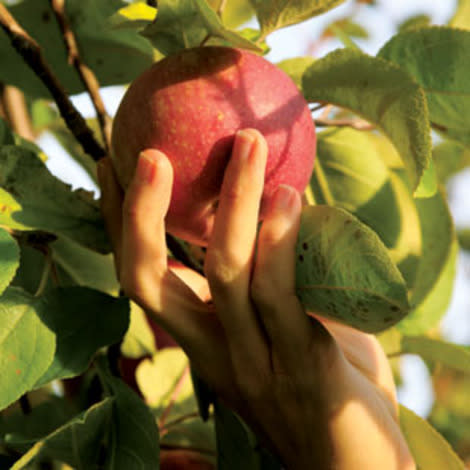Should You Be Picking Organic Apples?

By Brierley Wright, M.S., R.D., Nutrition Editor, EatingWell Magazine
Depending on where you live, apple season is either just around the corner--or already under way. As a dietitian, I love apples for their super-healthy nutrition profile: one medium apple delivers just 95 calories and 4 grams of fill-you-up fiber. Apples are also packed with disease-fighting antioxidants.
Don't Miss: How Apples Can Make You Skinnier & More Health Benefits of Apples
But because I work at EatingWell Magazine, people often ask me if they should be picking and buying organic apples.
It's a great question! Here's my two cents--as reported for EatingWell:
From a nutrition standpoint, the debate over organic produce versus conventional is ongoing. A 2009 review published in the American Journal of Clinical Nutrition reported that there is no sufficient evidence of a difference in nutrient quality. But a 2007 study by Newcastle University in the United Kingdom found organic produce has 40 percent higher levels of some nutrients (including vitamin C, zinc and iron) and a 2003 study in the Journal of Agricultural and Food Chemistry found that organically grown berries and corn have 58 percent more polyphenols--antioxidants that help prevent cardiovascular disease--and up to 52 percent higher levels of vitamin C than those conventionally grown.
Don't Miss: Fresh vs. Frozen Fruits & Vegetables: Which Is Healthier?
When it comes to pesticide exposure, this year the Environmental Working Group put apples at the top of its "Dirty Dozen" list (a list of fruits and vegetables with the highest pesticide residues) for the second year in a row. (Find out what other fruits and vegetables you should be buying organic here.) Buying organic apples will reduce your exposure to potential pesticide residues, since the USDA restricts all chemical pesticides. Long-term exposure to pesticides has been linked to cancer, infertility and neurological conditions, such as Parkinson's, and even small doses of pesticides are far more dangerous for children, with their smaller bodies and developing nervous systems.
According to David Wallinga, M.D., senior advisor in science, food and health for the Institute for Agriculture and Trade Policy, scientists believe that some pesticides wreak their damage by operating as free radicals, compounds that damage tissues in ways that can lead to the development of cancer and other diseases. Minimizing your exposure to pesticides will reduce this free-radical damage, of course, says Wallinga, but so will consuming more antioxidants, which mop up free radicals. And, as I mentioned earlier, apples--whether they're organic or conventional--are full of antioxidants, specifically flavonols, anthocyanins and vitamin C.
If you choose conventional, rinse your apples or remove the peel. Research shows that rinsing your apples thoroughly under running water removes some pesticides. No need for a fancy vegetable-and-fruit wash (or even a mild soap): scientists at the Connecticut Agricultural Experiment Station in New Haven have shown that plain water is just as effective.
A high percentage of the pesticide residues are found in the peel of the apple, so discarding the skin can reduce residues significantly--by up to 98 percent, according to a 2008 Journal of Agricultural and Food Chemistry study. That said, ditch the peel and you lose out on half the fiber and many of the antioxidants. "If your choice is to peel off the thing that carries many of the nutrients or feel freaked out that you're consuming pesticide residues," says Wallinga, "you may have the wrong apple in front of you."
If you, like me, pick your own apples every fall, don't hesitate to ask your local grower about his pest-management practices. "Organic certification can be expensive and he may be growing without pesticides but [not marketing as organic] because he doesn't want to have to raise his prices," says Wallinga. If a grower is spraying, ask when. "Some growers spray only in the spring before the fruits form," says Wallinga. "They nip the pests in the bud, so to speak." Residues generally originate from "preharvest" spraying in the fall after the apples appear.
Don't Miss: 7 Common Questions About Organics Answered
At the end of the day, eating fruits and vegetables is important, whether they're organic or not. And most Americans don't eat nearly as many fruits and vegetables as what's recommended. If you are shopping for a young child or have concerns about pesticides, you may choose organic for some foods, such as apples, that are more heavily contaminated. The important thing, whether you chose organic or conventional, is to enjoy delicious, nutritious apples while they're at their peak. (Find out how to choose the best apples for cooking and eating here.)
Do you pick organic apples?
By Brierley Wright, M.S., R.D.

Brierley's interest in nutrition and food come together in her position as nutrition editor at EatingWell. Brierley holds a master's degree in Nutrition Communication from the Friedman School of Nutrition Science and Policy at Tufts University. A Registered Dietitian, she completed her undergraduate degree at the University of Vermont.
Related Links from EatingWell:

